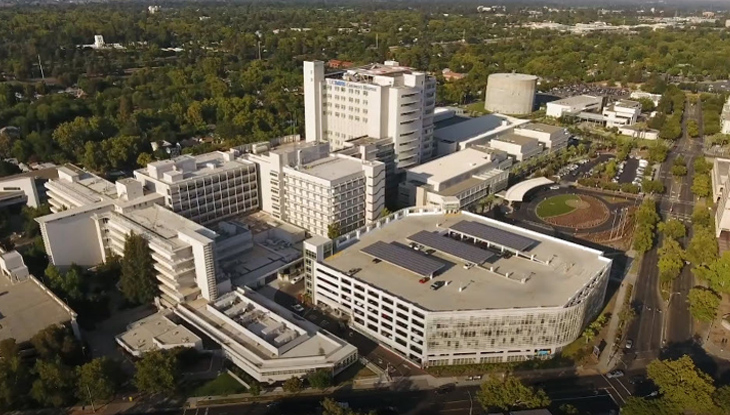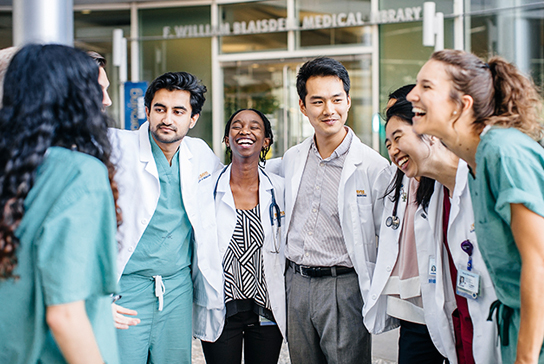Fellowship Programs
Endocrinology and Diabetes Fellowship
Thank you for your interest in our UC Davis Endocrinology Fellowship.
This program is two years in length and emphasizes both clinical and research training, aiming to train and assist each fellow in achieving their unique career goals. The ultimate goal of our UC Davis Endocrinology Fellowship Program is to nurture, train, and empower our physicians to become outstanding clinicians dedicated to improving the health of both their patients and communities.
Core Values
- Academic Excellence – Our fellows take pride in treating patients with complex medical conditions and engage in a variety of research and quality improvement projects in healthcare with the support of outstanding faculty who cultivate academic excellence.
- Community – Our welcoming fellows, staff, and faculty create an atmosphere that promotes wellness for our healthcare providers and our patients.
- Humility – Our Endocrinology teams care for one of the most diverse patient populations in the nation, serving each patient and community with humility.
- Leadership – Our teams lead with service in mind, are always accountable to others, and are highly respectful of their teammates, patients, and community.
If our values and mission resonate with you, then please consider applying for our program, as we strive to achieve these goals every day. Not only are the numerous fellowship programs at UCD Health excellent, but Sacramento is also a great place to live – (Take a glance at our Sacramento Campus!)
While we are proud of our program’s unique accomplishments, the number one reason to come here is the people. We have a wonderful group of fellows, an incredible and diverse group of distinguished faculty, and supportive, friendly administrators and staff who all strive to help you make the most out of fellowship training.
Dana Sheely, M.D. | Sonal Phatak, M.D.
Program Directors, Endocrinology, Diabetes & Metabolism Fellowship Program


Join the UC Davis Health and Sacramento Community: Where You’ll Want to Live, Work and Play!
MDS 406 - Endocrinology, Nutrition, Reproduction and Genetics (9.5)
Lecture—3.8 hours; discussion/laboratory—2.8 hours. Prerequisite: Biological Chemistry 410A; Human Physiology 400. Restricted to Medical students only. Basic and pathophysiologic processes involved in human reproductive and endocrine control systems, nutritional regulation, and foundational genetics across the lifespan. Integrate information across these systems and use clinical reasoning to identify and understand relevant perturbations and diseases. May be repeated three times for credit. (P/F grading only; deferred grading only, pending sequence completion.)
ENM 460 - Clinical Clerkship
Clinical activity (inpatient-outpatient service)—full time (3 days per unit). Prerequisite: Internal Medicine 430 and/or consent of instructor. Limited enrollment. Participation with members of subspecialty service in the initial evaluation, work-up, management, and follow-up of patients with endocrinologic disorders. (H/P/F grading only.)
Visiting Medical Students: The Division of Endocrinology, Diabetes, and Metabolism does not accept foreign medical students unless through Global Health. The program admits visiting students on a case-by-base basis.
Professional Course Coordinator
Reese Grey
email: mbalcayde@ucdavis.edu
Fellowship and Student Programs Coordinator
2025-2027
Leslie Ha
Med School: Case Western Reserve University School of Medicine
Residency: UC Davis Medical Center, Sacramento
Kevin Nguyen
Med School: Arizona College of Osteopathic Medicine of Midwestern University
Residency: St. Mary's Medical Center Medical Knowledge
Sumire Noguchi
Med School: Touro University College of Osteopathic Medicine - California
Residency: Highland Hospital - Alameda Health System
2024-2026
Winston Chang
Med School: College of Osteopathic Medicine of the Pacific at Pomona
Residency: Kaiser Permanente Fontana
Jasleen Kahlon
Med School: St. George's University
Residency: Drexel University College of Medicine / Hahnemann University Hospital
Kyle Yamamoto
Med School: Tufts University School of Medicine
Residency: Kaiser Permanente Santa Clara Internal Medicine
Where Are They Now?
2023-2025
Majd Wess
Med School: West Virginia School of Osteopathy Medicine WV
Residency: Unity Health, Searcy, AR
Miranda Rapp
University of California Davis Health
Sacramento, CA
Vedesh Babu
Med School: Vydehi Institute of Medical Sciences & Research Centre, Bangalore, India
Residency: Texas Tech University Health Science Center TX
2022-2024
Amie Cai, MD
Kaiser Permanente
Santa Rosa
John Christensen, MD
University of California Davis Health
Sacramento, CA
Mina Maximous, MD
Kaiser Permanente
Fontana, CA
2021–2023
Aaron-Ross Jimenez, M.D.
Sutter Health
Sacramento, CA
Minhthao Nguyen, D.O.
Providence Medical Foundation
Torrance, CA
2020–2022
Jun Beom Park, M.D.
Kaiser Permanente
Sacramento, CA
Deepti Pujare, M.D.
Sutter Health
Palo Alto, CA
Ushaanthy Ravindran, M.D.
John Muir Health
Walnut Creek, CA
2019–2021
Mopelola Adetola Adeyemo, M.D.
UCLA Health
Los Angeles, California
Andrea Marina Gonzalez Falero, M.D.
Sutter Health
Roseville, CA
2018–2020
Kearnan Welch, D.O.
Montage Medical Group
Monterey, CA
Arta Zowghi, D.O.
Sutter Health
Roseville, CA
2017–2019
Jameson Azul, M.D.
UC Davis Medical Center
Sacramento, CA
Wei Yang, M.D.
Kaiser Permanente
San Jose, CA
2016–2018
Arianne Furman, D.O.
Loma Linda Medical Center
Loma Linda, CA
Erin McCorry, M.D.
Kaiser Permanente
Vacaville, CA
2015–2017
Naseem Eisa, M.D.
Sierra Endocrine Associates
Fresno, CA
Naseem Eisa, M.D.
Sierra Endocrine Associates
Fresno, CA
Richa Singh, M.B., B.S.
West Virginia University Physicians of Charleston
Charleston, WV
2014–2016
Christine Cox, D.O.
Sutter Health
Roseville, CA
2013–2015
Samineh Madani, M.D.
Kaiser Permanente
San Jose, CA
Chrystal Wa, M.D.
Santa Clara Valley Medical Center
Santa Clara, CA
2012–2014
Audrey "Lisa" Arzamendi, M.D.
Palo Alto Medical Foundation
Capitola, CA
Dana Sheely, M.D.
UC Davis Medical Center
Sacramento, CA
2011–2013
Maya Allen, M.D.
Northbay Center for Diabetes and Endocrinology
Vacaville, CA
You Sher Tay, M.D.
Kaiser Permanente
Sacramento, CA
2010–2012
Jaspreet Kaur M.D.
Endo and Diabetes Center
Danville, CA
Rami Mortada, M.D.
Endocrine Center of Kansas
Wichita, KS
2009 – 2011
William Thomas Amess, M.D.
Kaiser Permanente
Vacaville, CA
Brandon Edward Chock, M.D.
Kaiser Permanente
Ontario, CA
2008–2010
Joyce Leary, M.D.
Kaiser Permanente
Sacramento, CA
Key Program Faculty
- Sonal Phatak, M.D., Program Director
- Dana Sheely, M.D., Program Director
- Jameson Azul, M.D.
- Aili Guo, M.D.
- Deborah Kathleen (Deb) Plante, M.D.
- Pamela Prescott, M.D.
- Prasanth Surampudi, M.D.
- Ajay Sood, M.D., Chief of Endocrinology, VA Mather
- Arthur Swislocki, M.D., Chief of Endocrinology, VA Mather
- John Yoon, M.D.
- Seleda Williams, M.D.


